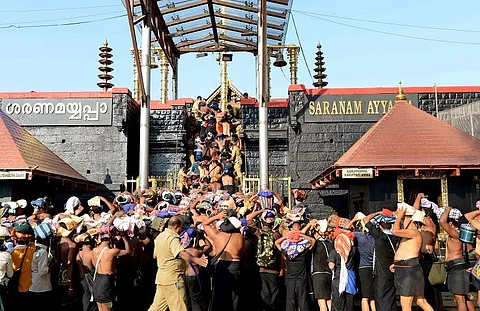

For more than three decades, the song ‘Harivarasanam’ has resonated at the famed Sabarimala Ayyappa temple in Kerala’s Pathanamthitta district.
Known as the ‘Urakka Pattu’ (lullaby) that puts the presiding deity Lord Ayyappa to sleep, the devotional song is rendered at around 11 pm, before the temple is shut for the day.
For years together, the version of the song sung by KJ Yesudas for the 1975 film Swami Ayyappan has been played at the temple. Now, this particular version could undergo a change and a re-recorded version could take its place.
The newly appointed president of the Travancore Devaswom Board (TBD) that governs the temple said that the song will be re-recorded to eliminate two mistakes in the earlier version.
Confirming this to TNM, president A Padmakumar said:
“The version that is now being played at the temple is a slight variation from the original song. In the original one, the word ‘swami’ appears in every line. For the ease of singing it in the film, this was omitted. Moreover, there is also an error in the song. ‘Ari vimardhanam’ (which means destruction of the enemy) has to be pronounced as two separate words. However, in the Yesudas version of the song, this is pronounced as a single word, which is incorrect. The new re-recorded song will correct these two issues.”
According to him, at the sanctum sanctorum, the temple priests orally sing the song (the original version with the word ‘swami’ in every line). However, the movie version of the song is played through the temple stereo for the devotees to hear.
Padmakumar said that they have reached out to Yesudas already and that the singer has expressed willingness to re-record the song.
“He is currently out of the country and is expected to come to Kerala in two weeks. We will have a word with him and decide the next steps,” Padmakumar said.
The decision to re-record the song, however, was not taken by TDB, but by the Harivarasanam Trust. It was a dispute in the authorship of the song that led to the formation of this trust a few years ago.
Who wrote the lyrics?
For the longest time, it was believed that the song was penned by Kumbakudi Kulathur Iyer in 1950. However, in 2014, the family of Konakathu Janaki Amma, who was the daughter of the head priest Ananthakrishna Iyer in the 1900s, claimed that it was not Kulathur Iyer, but Janaki Amma who penned the lyrics.
To substantiate their claims, the family also furnished a handwritten manuscript of the song that was originally written in 1920.
Padmakumar is a descendant of Konakathu Janaki Amma and was instrumental in forming the Harivarasanam Trust.
“My grandfather was the head priest at the temple and Janaki Amma was his sister. She wrote the song while she was pregnant with her child. After our family found the manuscript, we all got together to form a trust. Incidentally, I became the president of the TBD now,” he said.
Asked whether the Devaswom’s consent was required to play a re-recorded version of the song at the shrine, Padmakumar answered in the negative.
However, Prayar Gopalakrishnan, the former president of TBD – who had an uneventful exit recently, after his tenure was cut short by the state government – saw Padmakumar’s move as being in line with the “newfound habit” of trying to change things at the temple.
“Of late, we are seeing a tendency where everything about Sabarimala is being questioned and disputed. This is one such act,” Prayar commented.
Although Padmakumar felt that the Devaswom’s consent was not required to play the re-recorded version, Prayar has a different viewpoint.
“One person cannot arbitrarily take a decision. Any change should be brought in only with the full knowledge of the Devaswom. Good or bad, every decision needs to be taken by the board after thorough discussion. While I was the president, Ayyappa Seva Samiti had put forth a demand to rectify the mistakes in the Yesudas version. But when we discussed it with the singer, he wasn’t keen on it and we dropped it then and there,” Prayar said.
When TNM reached out to Devaswom Minister Kadakampally Surendran, he said that he was not aware of the matter at all.
“I am not aware of such a move to re-record the song,” he said.
Prayar, however, chose not to comment on the dispute regarding authorship of the song, saying: “That Janaki Amma wrote the song is a claim by certain people. There are documents available in the temple records that should be studied and a conclusion must be drawn.”